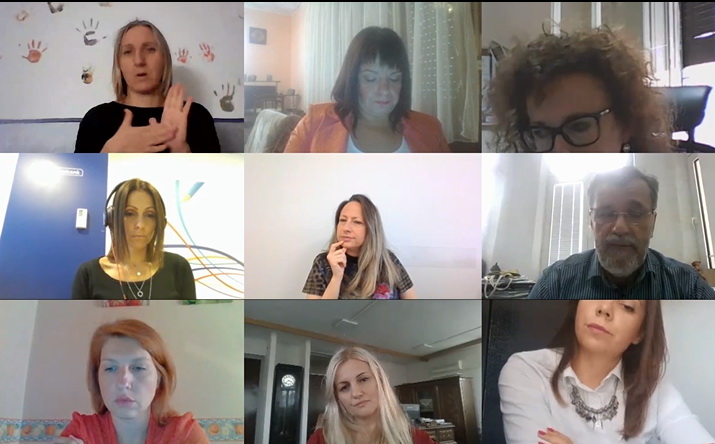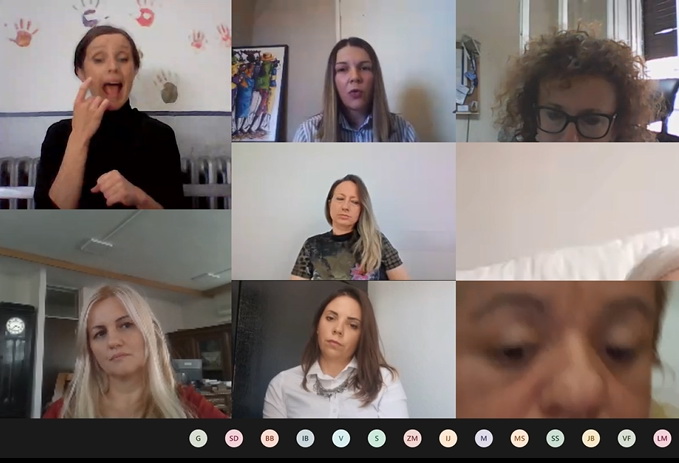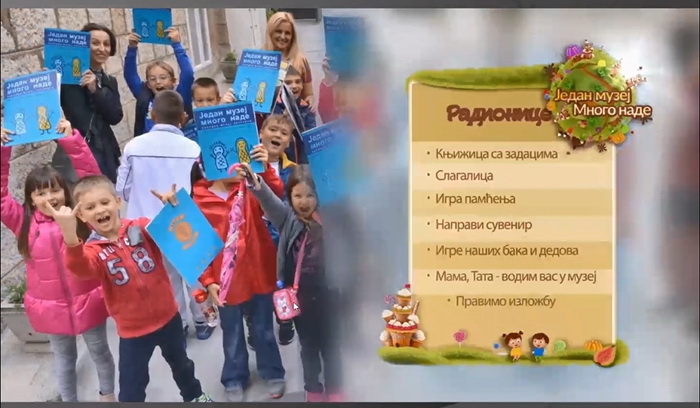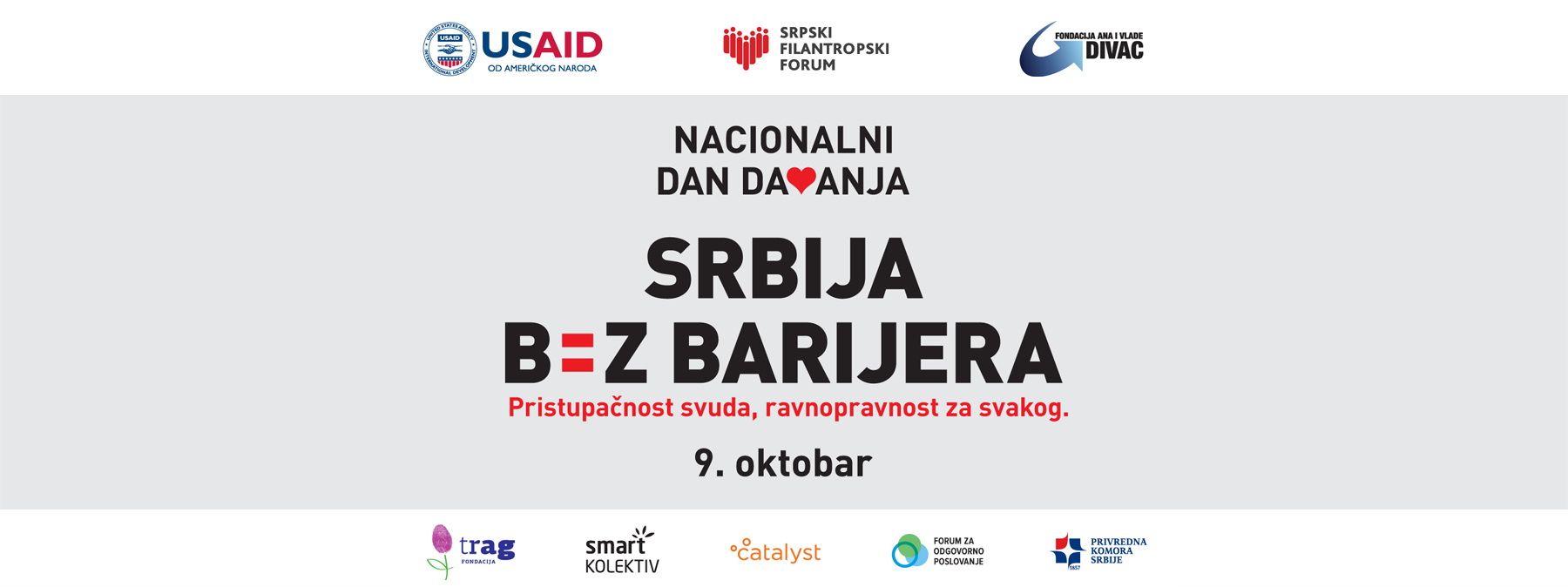 As part of the Accessibility Awareness Month (9 September – 9 October 2020), which this year was dedicated to the improvement of all forms of accessibility for persons with disabilities in Serbia, and for the society as a whole. The panel discussion entitled Serbia without Barriers – Positive Examples of Accessibility in our Society was held on the 7th of October.
As part of the Accessibility Awareness Month (9 September – 9 October 2020), which this year was dedicated to the improvement of all forms of accessibility for persons with disabilities in Serbia, and for the society as a whole. The panel discussion entitled Serbia without Barriers – Positive Examples of Accessibility in our Society was held on the 7th of October.
At the discussion opening session, moderated by Ljupka Mihajlovska from the Serbian Accessibility Alliance, the focus was placed on the importance of highlighting positive examples and practices related to the processes with which we strive to enhance our society, as well as on the fact that the public remains poorly informed and sensitised with regard to the challenges faced by almost a quarter of country’s population. “It is frightening when you realise how many people are invisible because the system is set up in such a way that they cannot be seen. That is why it is important to get fully involved and constantly learn so that we can really recognise and respond to inaccessibility”, said Veran Matić, the director of the Serbian Philanthropy Forum, and added that in the future their work would be particularly dedicated to fundraising for the translation centre for deaf persons, which should enable the 24-hour availability of translations for everyone in Serbia.
“We will become the society we strive to be only when we enable each individual to live independently and participate in all aspects of life, on an equal basis, with all their rights and obligations”, said Olja Jovičić, Secretary-General of the Protector of Citizens Expert Service. According to her, accessibility of the environment, services and information is a prerequisite for social contacts, independence and inclusion of people with disabilities in everyday life, which means that the environment must be such that everyone can use it, taking into account the diverse needs of the population and the need for everyone to be independent in exercising their rights.
 The Coordinator for Gender Equality and Human Rights of the Social Inclusion and Poverty Reduction Unit of the Government of the Republic of Serbia, Jovana Ilić, stressed that when we talked about accessibility, it actually meant accessibility for all people. “This means that every facility, service or product, event should be accessible to everyone, i.e. it should be in accordance with the concept, principles and standards of universal design”, said Ms Ilić. Since it was established in 2009, the Social Inclusion and Poverty Reduction Unit has been working on improving the position of persons with disabilities and other vulnerable social groups in the Republic of Serbia through participation in policy development, monitoring the state of accessibility and social inclusion of persons with disabilities, promotion and innovation of practices, enhancing the knowledge and capacity of decision-makers and employees in relevant institutions at the national and local level, promoting examples of good practice in the field of accessibility advancement.
The Coordinator for Gender Equality and Human Rights of the Social Inclusion and Poverty Reduction Unit of the Government of the Republic of Serbia, Jovana Ilić, stressed that when we talked about accessibility, it actually meant accessibility for all people. “This means that every facility, service or product, event should be accessible to everyone, i.e. it should be in accordance with the concept, principles and standards of universal design”, said Ms Ilić. Since it was established in 2009, the Social Inclusion and Poverty Reduction Unit has been working on improving the position of persons with disabilities and other vulnerable social groups in the Republic of Serbia through participation in policy development, monitoring the state of accessibility and social inclusion of persons with disabilities, promotion and innovation of practices, enhancing the knowledge and capacity of decision-makers and employees in relevant institutions at the national and local level, promoting examples of good practice in the field of accessibility advancement.
Starting with the project “Vračar without Barriers”, within which the Vračar Municipality prepared a map of inaccessibility on its territory, as well as the project “Accessible Information for All”, which enabled the establishment of an info desk for people with disabilities, translation of website content into sign language, subtitling and posting content in audio formats, this unit of local self-government has become one of the most significant positive examples of accessibility in the Republic of Serbia. As an important step in the further process of accessibility improvement, Irena Lakobrija Delić from the Office for Persons with Disabilities of the Vračar City Municipality emphasised the adoption of the Strategy for Improving Accessibility of Vračar City Municipality for the period 2018 to 2025 and the corresponding Action Plan, which envisage measures, time frame and bodies and persons in charge of implementing activities in the field of improving the accessibility of public areas, facilities and information. As a result of the established inter-municipal cooperation between the City of Belgrade, the City of Novi Sad and the City Municipalities of Savski Venac and Vračar, and with the support of the Government of Switzerland, the application “Info for All” was created, which provides service information in sign language, audio format and text form, a Braille printer was procured, and it was made possible for all citizens to report barriers they encounter in their environment.
Katarina Krunić from the Municipality of Svilajnac said that during the reconstruction of buildings on the territory of this municipality, it had become the standard to do everything to make the buildings accessible to different categories of the population, emphasizing architectural and visual accessibility. The Municipality of Svilajnac is the holder of the award given by the Protector of Citizens to local self-government units for improving all forms of accessibility. The award was received for improvements made to the accessibility of the Health Centre, which has ramps for people with disabilities, elevators and appropriate maps and guiding lines that enable easy movement and navigation in a given space. In this municipality, special attention was given to the accessibility of facilities in rural areas. Furthermore, the Natural History Museum in Svilajnac is one of the best examples of accessibility in the Republic of Serbia.
 Suzana Ranđelović from the National Museum in Leskovac presented the example of the Virtual Sign Museum, which enables visitors to go through the museum independently by using an application in sign language. Initiatives such as “One Museum – Lots of Hope”, the tactile exhibition of museum exhibits “Touch the Past”, which includes an audio guide, catalogue and guide in Braille, the application Multimedia Guide, which enables learning about the contents of the museum, and numerous workshops for children with disabilities, make the National Museum in Leskovac a significant example of continuous improvement of the accessibility of cultural contents.
Suzana Ranđelović from the National Museum in Leskovac presented the example of the Virtual Sign Museum, which enables visitors to go through the museum independently by using an application in sign language. Initiatives such as “One Museum – Lots of Hope”, the tactile exhibition of museum exhibits “Touch the Past”, which includes an audio guide, catalogue and guide in Braille, the application Multimedia Guide, which enables learning about the contents of the museum, and numerous workshops for children with disabilities, make the National Museum in Leskovac a significant example of continuous improvement of the accessibility of cultural contents.
As stated by Milena Stupar, within the concept of corporate social responsibility, Eurobank pays special attention to persons with disabilities, who should be equally enabled to perform their banking transactions. “We started by opening accessible branches, and then we organised training courses for our employees to enable them to communicate adequately with persons with disabilities. We also adapted our headquarters to the principles of design for all, which is why we received the Certificate on Inclusivity from the European Institute for Design and Disability”, said Ms Stupar. Eurobank endeavours to continue operating in accordance with accessibility standards, and some of its most important initiatives include inclusive parks, Moving Inclusive Museum, the “Art for ALL” project, press releases and advertisements in Braille, the “Cities for ALL” exhibit on the accessibility of European cities, collaboration with the Sports Association of Persons with Disabilities.
 The Serbia without Barriers – Positive Examples of Accessibility in our Society panel discussion was organised in cooperation with the Social Inclusion and Poverty Reduction Unit of the Government of the Republic of Serbia and Serbian Philanthropy Forum within the Accessibility Awareness Month. This year, the Accessibility Awareness Month was marked as a lead-up to the third National Giving Day, which is part of the “Framework for Giving” project funded by the United States Agency for International Development (USAID) and implemented by the Coalition for Giving, led by the Foundation “Ana and Vlade Divac”. Other Coalition members are the Trag Foundation, Catalyst Balkans, SMART Kolektiv, the Serbian Philanthropy Forum, the Responsible Business Forum and the Serbian Chamber of Commerce and Industry. Some of the activities within the National Day of Giving have been initiated and are conducted in cooperation with the Social Inclusion and Poverty Reduction Unit of the Government of the Republic of Serbia, as part of the “Support to Improve Social Inclusion in the Republic of Serbia” project, supported by the Government of Switzerland.
The Serbia without Barriers – Positive Examples of Accessibility in our Society panel discussion was organised in cooperation with the Social Inclusion and Poverty Reduction Unit of the Government of the Republic of Serbia and Serbian Philanthropy Forum within the Accessibility Awareness Month. This year, the Accessibility Awareness Month was marked as a lead-up to the third National Giving Day, which is part of the “Framework for Giving” project funded by the United States Agency for International Development (USAID) and implemented by the Coalition for Giving, led by the Foundation “Ana and Vlade Divac”. Other Coalition members are the Trag Foundation, Catalyst Balkans, SMART Kolektiv, the Serbian Philanthropy Forum, the Responsible Business Forum and the Serbian Chamber of Commerce and Industry. Some of the activities within the National Day of Giving have been initiated and are conducted in cooperation with the Social Inclusion and Poverty Reduction Unit of the Government of the Republic of Serbia, as part of the “Support to Improve Social Inclusion in the Republic of Serbia” project, supported by the Government of Switzerland.
 Government of the Republic of Serbia
Government of the Republic of Serbia















 pdf [271 KB]
pdf [271 KB]
Leave a Comment